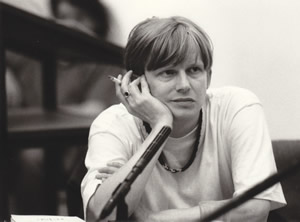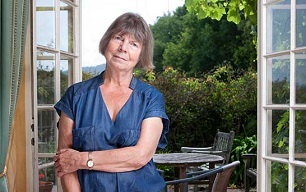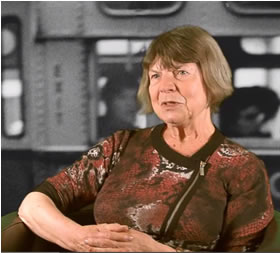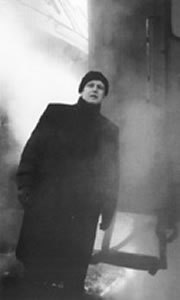De Duitse dichter en schrijver Thomas Kling werd geboren op 5 juni 1957 in Bingen. Zie ook alle tags voor Thomas Kling op dit blog.
Kriegsbeginn: Actaeon 1, Nach Pound
(für Ute Langanky)
Ein bild der Lethe,
und den feldern
Voll stumpfen lichts,
doch golden,
Graue kliffs,
und unter ihnen
Ein meer
Strenger als granit,
unruhig, niemals aufgebend;
Hohe gestalten
mit den gesten von göttern,
Gefährliche aussichten;
Und einer sagte:
»Das ist Actaeon.«
Actaeon mit den beinschienen von gold!
Über helle wiesen,
Übers überlegene gesicht dieses felds,
Unruhig, immer in bewegung,
Heere eines antiken volks,
Das stumme gefolge.
Actaeon 2
(für Mauritius Wenner)
so wird die akte Actaeons geschlossen. an einem fluß.
ein schlechtgetarnter und ertappter voyeur, der haar
und haut der badenden genau betrachtet hat. ihr pfiff:
schon springen Actaeon die eigenen hunde an, die haben
ihn sofort an hals und gurgel. es geht dann alles superschnell:
die linse eingespritzt, nicht nur mit speichel. hundegeifer
hat im nu dem seinen körper überzogen. gebisse, risse
gehen durch den Actaeon; die beinah stumme männer-
gurgel. so ohne körper, ohne strom; dabei beguckt: der
löst, als hirschenschrei, sich auf: die blicktransfusionen,
die nichts nützen können; kann, mit neuen, lauten augen,
Actaeon sehen die augen der frau? schweigsame augen.
ohne lust. es mag die meute ihren Actaeon! wie sie sein
hirschfleisch lieben, seine augenkamera! und hören nicht
auf ihre namen so wird die akte Actaeon geschlossen.
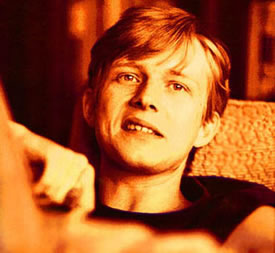
Thomas Kling (5 juni 1957 – 1 april 2005)
De Nederlandse literair criticus Carel Peeters werd geboren in Nijmegen op 5 juni 1944. Zie ook alle tags voor Carel Peeters op dit blog.
Uit: De jaloezie van de tijd. A.F.TH. van der Heijden
„Het is met De tandeloze tijd als met die andere ambitieuze cycli, Prousts A la Recherche du Temps Perdu en La Comédie Humaine van Balzac: het zijn alle drie zulke ruime titels dat er meerdere delen in kunnen zwemmen. De tandeloze tijd is van de drie misschien wel het minst eenduidig en het suggestiefst, op zoveel manieren blijkt hij te kunnen worden uitgelegd. De eerste associatie bij zo’n titel is de voor de hand liggendste. Wat bij De tandeloze tijd verschijnt is het laatste kwart van de twintigste eeuw, onze eigen tijd, gebed in het dons van welvaart en verzorging. Zo’n eerste associatie is veelzeggend: blijkbaar is er maar al te zeer reden voor en er zijn kennelijk genoeg verschijnselen die deze tijd tandeloos maken. Maar associaties kunnen bedrieglijk zijn, het zijn niet zelden alleen maar luie impressies. Al komen ze nooit helemaal uit de lucht vallen, ze zijn soms gemakzuchtig en gauw tevreden. In het geval van De tandeloze tijd gaat het bij die eerste associatie om een soort poëzie die van bepaalde slagwoorden (verzorgingsstaat, welvaartsstaat, restauratie, post-modern relativisme) een goedklinkende som maakt (‘een tandeloze tijd’). Zoveel poëzie is alleen mogelijk wanneer andere verschijnselen worden weggedrukt die wel degelijk in het bezit zijn van tanden (ongebreidelde verzakelijking, profijtbeginsel, carrièrezucht, yuppiedom, patserig individualisme).
De titel van Van der Heijdens romancyclus is een vrijmoedige interpretatie. Het bevat een vruchtbare spanning die gedachten in beweging kan zetten, zodat de vraag kan opkomen: is dat van die tandeloosheid wel helemaal zo? Wanneer de periodiek drankzuchtige advocaat Quispel in Advocaat van de hanen zegt dat de wereld haar smaak heeft verloren, en dat niets ‘restte om nog de tanden in te zetten’ dan is de vraag of we hier niet te maken hebben met zijn geblaseerdheid en tandeloosheid, en niet van de tijd waarin hij leeft.“

Carel Peeters (Nijmegen, 5 juni 1944)
De Franse feministische schrijfster, dichteres, professor, filosoof, literair criticus en historica Hélène Cixous werd geboren in Oran, Algerije, op 5 juni 1937. Ze heeft een Duitse, Asjkenazisch-Joodse moeder en een Algerijns, Sefardisch-Joodse vader. In 1957 kreeg ze haar agrégation in Engels en 1968 werd ze doctorandus in de letterkunde. Zij richtte zich toen vooral op Engelse literatuur en de werken van James Joyce. In 1969 publiceerde Cixous L’Exil de James Joyce ou l’Art du remplacement, het jaar daarop Dedans, een gedeeltelijk autobiografische roman. Cixous kreeg voor Dedans de Prix Médicis. Zij publiceerde veel, waaronder drieëntwintig gedichtbundels, zes essays, vijf toneelstukken en veel invloedrijke artikelen. Samen met Luce Irigaray en Julia Kristeva, wordt Hélène Cixous gezien als een van de moeders van de poststructuralistische feministische theorie. Sinds de jaren 90, hebben ze samen grote invloed gehad op het Franse feminisme en de feministische psychoanalyse. In 1975 publiceerde Cixous haar meest invloedrijke artikel: Le rire de la Meduse.
Uit: Voiles
„La myopie était sa faute, sa laisse, son voile natal imperceptible. Chose étrange, elle voyait qu’elle ne voyait pas, mais elle ne voyait pas bien. Chaque jour il y avait refus, mais qui pouvait dire d’où partait le refus : qui se refusait, était-ce le monde ou elle ? Elle était de cette race obscure subreptice qui va désemparée devant le grand tableau du monde, toute la journée en posture d’aveu : je ne vois pas le nom de la rue, je ne vois pas le visage, je ne vois pas la porte, je ne vois pas venir et c’est moi qui ne vois pas ce que je devrais voir. Elle avait des yeux et elle était aveugle.
Elle devait passer tous les jours au large du château. L’aide venait de la statue de Jeanne d’Arc. La grande femme en or brandissait sa lance flamboyante et lui montrait la direction du château. En suivant l’indication d’or elle finissait par y arriver. Jusqu’au jour où. Un matin sur la place il n’y avait rien. La statue n’était pas là. Il n’y avait pas trace de château. À la place du saint cheval une pénombre mondiale. Tout était perdu. Chaque pas augmenterait l’égarement. Elle resta pétrifiée, privée de l’aide de sa statue. Elle se vit arrêtée au sein de l’invisible. De toutes parts elle voyait ce rien pâle sans limites, c’était comme si par un faux pas elle était entrée vivante chez la mort. L’ici néant durait, et personne. Elle saisie, tombée debout dans l’étendue insondable d’un voile, et voilà tout ce qui restait de la ville et du temps. La catastrophe s’était produite en silence.
Et maintenant qui était-elle ? Seule. Un petit clou de travers dans l’intervalle.
Plus tard dans l’intervalle quelqu’un abruptement surgi du rien lui affirma que les choses n’avaient pas fui du tout. Elles étaient à leur place assurément. Ainsi c’était elle qui ne voyait pas la statue ni le château ni les rebords du monde ni l’autobus ? Une voilette de brume avait eu raison des existences à ses pauvres yeux crédules. La grande statue d’or n’avait pas résisté. Ce fut sa première apocalypse. La ville perdit de sa solidité.“

Hélène Cixous (Oran, 5 juni 1937)
De Amerikaanse schrijver en acteur Spalding Gray werd geboren op 5 juni 1941 in Barrington, Rhode Island. Zie ook alle tags voor Spalding Gray op dit blog.
Uit: Life Interrupted
„We were invited to the Scanlon estate. John Scanlon was a publicist, a very big one, in all senses of the word. He was a publicist for Bill Clinton, actually, during the Monica Lewinsky scandal, and he had this huge house in Ireland that he was inviting a group of us over to for this birthday bash. He was a big gourmand, and he perished in front of the TV after a big meal just two weeks before we were supposed to go, just died. His wife said, “Come on over anyway, John would have loved it.”
So over we went, in spite of his death, about twelve of us, five children — my niece, my stepdaughter, and my two sons, and Tara Newman’s son — and the rest adults, and the house was big enough to accommodate that without any confusion. I have to say that this place, exquisite stone manor that it was, reminded me a little bit of The Shining. It was disconcerting, actually. It was set right in the middle of these woods and fields, and the kids went running in the fields with no fear of deer ticks for the first time in a long time. The woods looked like Harry Potter woods; they were very old, it was about twelve acres of land, and all very spooky. It was in the town of Mort, which was even more of a spooky name, in the county of Offaly. O-f-f-a-l-y.
We arrived on the longest day of the year, June 21, 2001, and all went to celebrate with a treasure hunt. In the morning, the following day, the next-longest day of the year, Barbara Leary was down in the kitchen — Barbara Leary was the ex-wife of Timothy Leary and she was one of the guests there — and I was talking with her and she said that she’d dreamt that I’d done a new monologue, and I said, “No, there’s nothing on the table, really, nothing new. My life is without crisis and usually they’re based on crisis, and I don’t have anything planned at all. Things are going smoothly.”

Spalding Gray (5 juni 1941 – 10 januari 2004)
De Ierse dichter, schrijver en schilder Christy Brown werd geboren op 5 juni 1932 in Dublin. Zie ook alle tags voor Christy Brown op dit blog.
What Her absence Means
It means
no madcap delight will intrude
into the calm flow of my working hours
no ecstatic errors perple
my literary pretensions.
It means
there will be time enough for thought
undistracted by brown peril of eye
and measured litany of routine deeds
undone by the ghost of a scent.
It means
my neglect of the Sonnets will cease
and Homer come into battle once more.
I might even find turgid old Tennyson
less of a dead loss now.
It means
there will be whole days to spare
for things important to a man –
like learning to live without a woman
without altogether losing one’s mind.
It means
there is no one now to read my latest poem
with veiled unhurried eyes
putting my nerves on the feline rack
in silence sheer she-devil hell for me.
It means
there is no silly woman to tell me
‘Take it easy – lie’s long anyway –
don’t drink too much – get plenty of sleep -‘ and other tremendous cliches.
It means
I am less interrupted now with love.

Christy Brown (5 juni 1932 – 6 september 1981)
De Britse schrijver, dramaturg en regisseur David Hare werd geboren op 5 juni 1947 in Sussex. Zie ook alle tags voor David Hare op dit blog.
Uit: David Hare’s ‘Stuff Happens’: All the President’s Men in ‘On the Road to Baghdad’
(Bespreking door Ben Brantley in de New York Times, 14 april 2006)
„CONTRARY to what the American politicians of David Hare’s “Stuff Happens” might believe, bigger doesn’t always mean more powerful. The Public Theater’s invigorating new production of Mr. Hare’s journalistic drama about the road to war in Iraq, first mounted with epic proportions at the National Theater in London in 2004, is here conducted on the modest scale of a town-hall meeting. It is as if a telescope, first set up to be looked through at the wrong end, were now righted, changing not composition but perspective.
The characters, who include the sitting American president and British prime minister and many of their cabinet members, feel closer to the audience — not just physically but emotionally. Often, they seem less like destiny-shaping, arbitrary gods than like the ego-trippers in your office. If that means they are too close for comfort, then “Stuff Happens,” which opened last night under the smart, sharp direction of Daniel Sullivan, is doing its job.
Shrinkage may be the best thing that could have happened to Mr. Hare’s quasi-documentary play. When I saw it in London, on the immense stage of the Olivier auditorium at the National, directed by Nicholas Hytner, the play had the marmoreal quality of mythic events carved into a temple frieze.“

David Hare (Sussex, 5 juni 1947)
De Zwitserse schrijver en uitgever Otto Friedrich Walter werd geboren op 5 juni 1928 in Rickenbach.
Uit: Wie wird Beton zu Gras? — Fast eine Liebesgeschichte
(Bespreking door W. Martin Lüdke in Zeit- Online, 24 augustus 1979)
„Nicht mehr Studenten sind es, Randgruppen, im bürgerlichen Sinn „Ausgefiippte”, die am Rande der Stadt (wie in der „Verwilderung”) und in den Randbereichen der Gesellschaft ohnehin, versuchen, neue, andere Lebensformen zu entwickeln, die es ihnen erlauben, auf eine humane Weise miteinander umzugehen. Zwar geht es auch in dieser Erzählung wieder um das „Neue” und um das „Mögliche” — gegen die etablierten Verhältnisse. Zwar ist auch hier wieder etwas von der Zartheit und Diskretion zu spüren, mit der Walter erzählen kann, und von der Sinnlichkeit auch. „Koni schaffte zum Lautsprecherwagen mitten auf der Parkwiese-^ Eben noch habe Nik dort gestanden. Koni ging dann weiter. Er kickte mit dem rechten Fuß einen leeren Papierbecher hinter seinem linken Absatz zur Seite. Esther mußte ein wenig lathen, als er plötzlich, schon zwölf Meter von ihr entfernt, den Handstand machte, ein bißchen auf den Händen weiterging” — hier kommt etwas von der fröhlichen Tollkühnheit durch, mit der die beiden am Ende ihren Panzer, Konis Panzer, durch die Stadt fahren, von der Tollkühnheit, mit der einmal die Macht der Phantasie gefordert wurde.
Die fast noch kindliche Unbeschwertheit der beiden Geschwister, die eher zufällig in die Demonstration geraten sind, ahnen allenfalls, worum es geht, und sind doch fasziniert von der Lebensweise, den Möglichkeiten des miteinander Umgehen s, die sie dabei erfahren, diese Unbekümmertheit läßt sie klare Alternativen erkennen, obwohl sie nur dumpf in sich spüren, wie da etwas ihren eigenen Bedürfnissen und Interessen, ihren Gefühlen entgegenkommt, was in der Welt, in der sie leben, ,.dem Alten”, keinen Platz hat. Ihre kindliche Zuversicht wird freilich, man muß sagen: in einem Lernprozeß auf eine harte Probe gestellt. Was „am 2. Juni in den Parkanlagen hinter der Friedenskirche in Ölten” beginnt, eine große Schweizer Demonstration gegen den Bau von Kernkraftwerken, hat Folgen.“

Otto F. Walter (5 juni 1928 – 24 september 1994)
De Engelse schrijfster Ivy Compton-Burnett werd geboren op 5 juni 1884.
Uit: Schwarze Utopie (Bespreking van Männer und Frauen in Der Spiegel)
„Sie reden fernab jeder Kindlichkeit: raffinierte Dialektiker, die wie Winkeladvokaten ihrer selbst argumentieren, um sich im Legitimationslabyrinth der Konversation zurechtzufinden. “Bist du taub?” beschimpft Horace seine älteste Tochter. “Wenn du jemanden taub nennst”, antwortet ein Sohn, “kannst du nicht von ihm erwarten, daß er hört: Dann kannst du ihm auch keinen Vorwurf machen.”
Etwas sanfter, dafür aber um so hinterhältiger wirkt die Gewalt der Konversations-Konventionen in dem früheren Roman “Männer und Frauen”. Hier wird eine Familie vorgeführt, die unter dem tyrannischen Diktat einer kränkelnden Mutter steht. Die versucht eines Tages, sich umzubringen; der Selbstmord mißlingt, dafür verfällt sie dem Wahnsinn und muß längere Zeit in einer Heilanstalt verbringen.
Gesund taucht sie dann wieder auf, um sich aufs neue störend in alles einzumischen. Dem setzt der älteste Sohn ein Ende, indem er seine Mutter vergiftet, ein Mord, der mit Erfolg vertuscht werden kann. Sir Godfrey, der Vater, träumt schon von einer neuen Ehe (mit einer Ehemaligen seines Sohnes), muß aber bei der Eröffnung des Testaments erfahren, daß er durch eine zweite Heirat seine Einkünfte verliert. Über diese unerwartete Rache seiner Frau ist er zunächst schockiert, aber nur für einen Moment. Denn sofort und fast automatisch beginnt er mit Umdeutungsübungen, die die Ereignisse und Gefühle wieder zurechtlegen sollen:
“Für mich ist es zu Ende mit den guten Dingen des Lebens. So ist es nur recht und billig, das gebe ich zu. Vermutlich dachte meine Frau, es sei mein innigster Wunsch, in der Vergangenheit zu leben. Sie wollte ihren Gatten behalten. Und das freut mich. Ich fühle mich erhoben und geschmeichelt. Was in meiner lieben Harriet vorgegangen ist, verstehe ich so gut, als hätte ich es mir selbst erklärt. Ja, ich kann sagen, sie hat es mir erklärt, nur daß ich kein Gedächtnis für solche Dinge habe.”

Ivy Compton-Burnett (5 juni 1884 – 27 augustus 1969)
Zie voor alle bovenstaande schrijvers ook mijn blog van 5 juni 2009.
De Egyptische schrijfster Alifa Rifaat werd op 5 juni 1930 in Caïro geboren. Zie voor onderstaande schrijfster ook mijn blog van 5 juni 2007.
Uit: Distant View of a Minaret and Other Stories
„In an instant between sleep and wakefulness, an instant outside the bounds of time, that gave the sensation of being eternal, the sounds of night, like slippery fishes passing through the mesh of a net, registered themselves on Zennouba’s hearing, filtering gradually into her awakening consciousness: the machine like croaking of frogs and the barking of dogs in the fields answered by the dogs of the village on the other bank in a never-ending exchange of information in some code language“.

Alifa Rifaat (5 juni 1930 – ? 1996)
Caïro, Citadel (geen portret beschikbaar)
